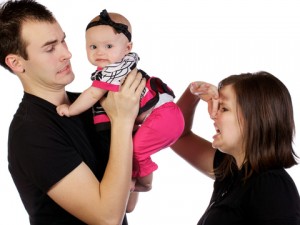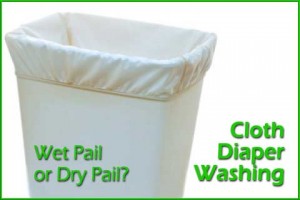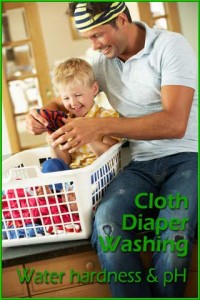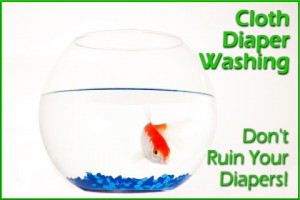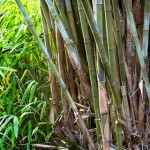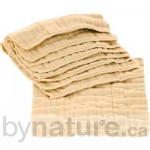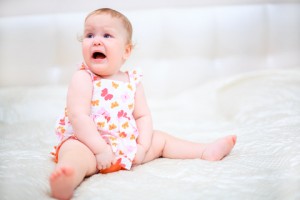
Once you understand the basics of pH, water quality, your machine, and your materials, you will be able to choose the best laundry routine to get your diapers clean. Once you really get those basics, washing cloth diapers is easy.
Seeing through a mystery and mastering your own choices is invigorating. That’s how understanding laundry science feels for me. I’m not a scientist, but I have plenty of scientists who have willingly answered my questions over the past couple of months as I’ve been writing about cloth diaper washing, and now I GET the science of cloth diaper laundry.
If you want the easiest possible solution for washing your cloth diapers, use Allen’s Naturally laundry liquid (the cleanest rinsing laundry detergent we have found, but not the only detergent we recommend) and follow Real Diaper Association’s simple 5-step guidelines.
- DUMP solids into the toilet
- RINSE on warm, because soils come out better at the temperature they went in (body temperature)
- WASH with detergent in hot water
- RINSE twice in warm water
- DRY
For most people, that’s all you need to know.
If it doesn’t work every time, that doesn’t mean cloth diapers don’t work. It means that you need to adjust your laundry routine for your situation. If it seems too difficult to understand your situation, remember that you could just dump your diapers in the garbage after every change. If you are here, you probably don’t want to do that. So, just invest a little time to learn laundry science, so you will no longer have to rely on advice that isn’t grounded in evidence. Back away from secret, proprietary formulas and mystery fixes to take charge of your own wash.
Laundry science knowledge will set you free.
Just wash the diapers and focus on the rest of your life!
The Basics
Get Cloth Diaper Washing Right from the Start
Our customers come to us for troubleshooting when cloth diapers are stinky or leaky. We can help, but we also know that you will save time, money, and grief if you understand your situation before you get into a laundry routine that will leave you with a stinky mess. Look at water quality, your washing machine, the materials used to make your diapers, then start simple.
Your Washing Machine and Cloth Diapers
When you are washing cloth diapers every few days, your washing machine is one of the important variables in the laundry routine. Whether you use top-loading or front-loading, HE or an old clunker, you can get your diapers clean with some adjustments. Keep in mind, though: your washing machine is far less important than your washing process. Read that twice if you need to because I’m telling you that you can get your cloth diapers clean in any washing machine.
pH is measure of whether a solution is acidic or alkaline. Did you know that newborn skin is more alkaline than yours? A little background in science will help you keep your baby healthy and your diapers clean.
Which will work better for your diapers? We will walk you through the pros and cons of your diaper pail choices. The short answer: there isn’t a lot of difference in choosing wet or dry pail. Starting with a dry pail is simple, and many families don’t find the need to try a wet pail.
Common Issues
Are your diapers repelling and your covers leaking? Do clean diapers smell like a barnyard and wet diapers burn your nose? You may have residues in your diapers. Before you contemplate throwing it all away, learn the fix.
Hard Water and Cloth Diaper Washing
Hardness refers to mineral content in the water (usually calcium and magnesium). Most of us have hard water, and some of us have very hard water. Hard water doesn’t react as much with soap. Why? That’s a science lesson. And, once again, basic science has saved your cloth diapers.
How to Ruin Your Cloth Diapers
You can avoid laundry crazy by understanding laundry reality. We walk you through the Goldilocks Laundry Solutions—not too much; not too little; just right. With detergent, water, bleach, heat, sun, enzymes, or essential oil, it does sometimes matter whether you use too much or too little.
Detergent & Additives
Cloth Diaper Detergent Choices
Understand hard water, pH, washing machine, and residue before deciding on your cloth diaper detergent because these factors all matter. Unless you just want a very simple detergent that does the job. We’ve got that.
Artificial Fragrances in Your Home

Artificial fragrances lurk unmarked in many of your household cleaning products. These fragrances can be bothersome as they leave residues, irritating when they are allergens and harmful when they pose known health risks.
We all love truth in advertising. “Hydrophobic chemicals in fabric softeners reduce absorbency of your cloth diapers but feel smooth against your baby’s skin.” Making your cloth diapers soft has to be a good thing, right? Of course, but don’t be fooled into using chemical fabric softeners to do it or you will be in for a leaky, repelling surprise. First rule of fabric softener for cloth diapers: don’t use it. There are natural ways to soften cloth diapers.
Enzymes are naturally occurring, biodegradable, and they help break down the organic matter in dirty diapers. What’s not to love? Enzymes too often end up on the list of bad additives, and that place just isn’t justified. Learn what enzymes do to clean cloth diapers, when they work, when they don’t, and how to use enzymes. Don’t be the person who says, “Enzymes don’t make sense to me, so I don’t use them.”
Cloth Diaper Detergent Additives to Avoid, Usually
The no-nos, the naturals, and the basic cleaners. There are some firm rules, but a lot of additives matter only depending on your specific situation. Once you understand the additives, you can choose a detergent that works well for your diapers, your water, and your machine. Stop believing that some additives are just bad for cloth diapers.
Do You Use Baking Soda and Vinegar?
You will find a lot of advice about using both baking soda and vinegar on cloth diapers. Do you know which situation calls for which solution? If you don’t know the difference and you use the wrong cleaner, it won’t help. We explain for each: what it is, what it does, when to avoid it, and when to use it on your cloth diapers.
Materials Matter
Animal, Vegetable, or Mineral?
Different materials need different treatment to keep them functioning well for diapering. Animal (wool diaper covers), vegetable (cotton, hemp, bamboo rayon), and mineral (polyester, laminate, microfibre) are easy ways to understand diaper fibres and what they need to get clean.
Hemp vs Bamboo Rayon for Cloth Diapers
We get a lot of questions from customers in the bynature.ca store asking why they would want to choose bamboo vs. hemp for cloth diapers. Short answer: choose hemp for environment or absorbency, and choose bamboo rayon for softness.
Cotton Diapers: Do You Choose Organic or Not?
We were surprised when we asked customers about organic cotton diapers because their reasons for choosing organic don’t always match what we know about the benefits of organic. We recommend organic over non-organic, but our reasons might not be what you expect.
Why we don’t carry cloth diapers that come without support or warranty. In our eight years of experience, the bottom line is: you get what you pay for. When you buy your diapers from us, you’re also investing in our experience helping thousands of clients along the way to getting off to a great start, with product support, laundry advice, and troubleshooting.
We Can Help!
If you have laundry issues, come by the bynature.ca store in Orillia. We want you to succeed in using cloth diapers, and a very big part of your success is getting the care of your diapers right. We can help you find solutions that work for your cloth diaper laundry.
Image © Monkey Business Images | Dreamstime.com



